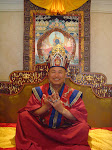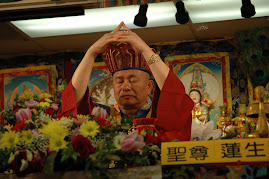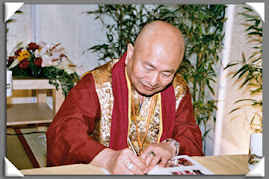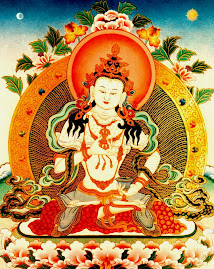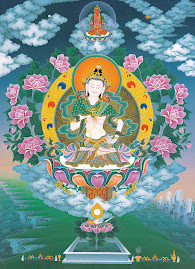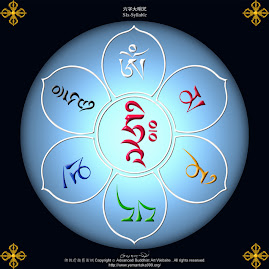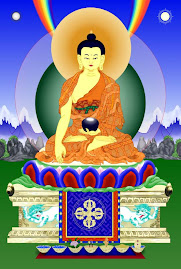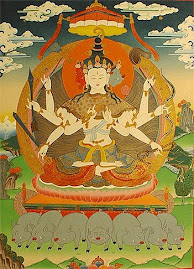Create your free world visitor maps
Tuesday, November 25, 2008
Friday, January 4, 2008
Vegetarian
Written by Living Buddha Lian-sheng, Sheng-yen Lu
Someone once asked the Dalai Lama: In Tantric Buddhism, are practitioners required to be vegetarian??
The Dalai Lama replied: Personally I am a vegetarian, but the lamas are not.
If one is not a vegetarian, then one kills; isn’t that a violation of the precepts?
The Dalai Lama ambiguously replied, Even if one eats meat, one does not necessarily kill. Being a vegetarian is not necessarily relevant to killing. With an awkward smile, he added: The lamas do not kill, yet they are not vegetarians?
When I was dining with Ganbu, a senior monk at the Drepung monastery, we were served only meat.
To my knowledge, vegetarianism is a product of Chinese Buddhism. It was originally created by Xiao Yan, the Emperor Wudi of the Liang dynasty for Buddhist practitioners. The idea was to cultivate compassion and alleviate the creation of negative karma.
There are benefits to vegetarianism, however it is not the primary requirement for Buddhahood; otherwise the cows, horses, and sheep would all have become Buddhas.
Many Buddhist novices are not adapted to being vegetarians. In this case, they may start by eating three kinds of clean meats, such as: not witnessing the slaughter, not hearing the slaughter, and not asking someone else to kill for them. This is a convenient way to enter into vegetarianism.
Do I require True Buddha Tantric practitioners to be vegetarian?
My answer is that it is voluntary.
Although this is the case, those who consume meat should first purify the food by blowing the air. By reciting the Manjusri Deliverance Mantra, this delivers the spirits of those to be consumed to a better realm. Since we are generating compassion towards them, we will not be creating any negative karma. Therefore eating meat is fine if this method is practiced.
In terms of vegetarianism, there is a difference between Sutric and Tantric Buddhism. In any case, please remember the following teaching of the Buddha:
A mouthful of pure water
Contains millions of living organisms.
If one does not recite mantra,
It is as if one kills.
Although it may seem insignificant, one cannot afford to neglect this principle.
True Practice
I remember one night when I was performing my duties for
Back then, my arms and legs were often manipulated by the invisible spiritual master, and these experiences made me realize that Gods and spirits really exist in this universe; that there is such a thing as a "spiritual world", and the "invisible" does exist. I hence made a vow that this shall be my conviction in life and I would cultivate truthfully.
Once I was lazy and uttered, "Why should I practise the Dharma arts? In times of need, all it takes is the help of my invisible teacher to settle things for me."
I was reprimanded for making such a statement!
I have studied the Tantric teachings for many years, entering into retreat for three years at the Ling Xian (Spiritual Immortal) Villa in
My blood type is 'O', depicting a strong character with great patience. When faced with any assignment, I will complete it, no matter what. I am down-to-earth, and shun laziness. You can say I am silly and idiotic, but I am ver serious and committed to my cultivation.
I often say that writing and practice are the two important duties of my life, and they are activities I must perform daily. My writing improves over time, as does my spiritual unfolding through practice. No one can ever take that away from me!
Let me say this to you. I am a true Vajra Guru. On what basis do I say this? I say this on the basis that I truthfully practise the True Buddha Tantric Dharma daily, without fail.
There are many pseudo Master among us in today's society, and they all claim, "With a single empowerment, the three main channels shall circulate freely."
"With one single empowerment, the spiritual foetus shall be conceived."
"With one single empowerment, one shall live to be more than a hundred years old."
"With one single empowerment, the Dharma Wheel shall spin on its own, and one will not need to make any effort in cultivation."
How true are such claims? Please do not ask me. You may refer to the words of Padmasambhava, which state, "Honor the Guru, treasure the Dharma, and practise diligently."
Please remember this:
Practice with perseverance and patience. Never crave for magical approaches and never look for short cuts. Be practical and honest with your cultivation!
The Birthday of Buddhas and Bodhisattvas
Dharma talk on 15/02/91
One of my disciples wrote to me a few days ago, as his father wanted to ask me a touchy question. If I can answer to his satisfaction, he will take refuge in me , otherwise he would not have any confidence in me. The question is : "Why was the date seventeenth of November (Lunar calendar) chosen as Amitabha Buddha's birthday ?"
Various Buddhist Sutras told us that Amitabha Buddha was an Indian Prince who renounced the world and was later on ordained as Dharmakara (mind of the Law).(So was Sakyamuni Buddha) The name of Amitabha Buddha had been mentioned many times, in the Amitabha Sutra and Sukhavativyuha Sutra by Sakyamuni Buddha. Therefore, we can safely conclude that Amitabha Buddha must have lived long before Sakyamuni Buddha was born.
To-date, we still do not have any concrete evidence to prove that Sakyamuni Buddha was born two thousand five hundred years ago. In fact, it has been a contentious subject at this juncture, as Sakyamuni Buddha's birthday is celebrated on a different date by Buddhists in
In short, no one really knows for sure when Sakyamuni Buddha was born.
If we can't even tell the birthday of Sakyamuni Buddha, who was born after Amitabha Buddha, how can we know the birthday of Amitabha Buddha for sure ?
However, there is a record on how Amitabha Buddha's birthday was chosen. A Zen master by the name of Yong Ming Shou (meaning forever bright and long life) in
As you know, there are eighteen Padmakumara (Lotus Lads) residing in the heaven realm. The date, May the eighteenth, has been chosen as the birthday of Padmakumara, since this was the day Padmakumara was born into this Samsara world.
Master Padmasambhava is said to be born out of lotus flower at the Guo Xiao sea. And July the tenth is considered to be his birthday. In other words, a child just appeared on the lotus flower, and the day his father, the king carried him back to the palace was deemed to be his birthday. The birthday can never be accurate, as we do not know how long he had stayed put on the lotus flower. It could have been three days, four days, or even ten days before he was found.
In conclusion, they are quite a lot of records on the birthdays of many Buddhas and Bodhisattvas, although the records might not be accurate. It is not necessary to care too much about the accuracy of them - just take the days they came to this world as their birthdays.
The Antidotes Against Ignorance
Dharma Talk on 13/10/1993
(page 79-80 Achievement of Rainbow Light Body Volume Seven)
I talked about "greed" and "hatred" the last two days. Today, I am going to touch on the antidotes against "ignorance". Some of us are born with poor memory, others are very weak in comprehension, therefore our ignorance can be considered in-born. What are the antidotes ? Two words can explain it all - "extra effort". A smart person may use only five minutes to memorize it, while a not so intelligent person may have to spend as long as fifty minutes to do the same. To understand a complicated issue, a clever person may use one hour, while a stupid person may spend up to ten hours. As the Chinese saying goes : "Hardworking can compensate for our clumsiness, " Only diligence can help us overcome our stupidity.
"Extra effort" is also prescribed by both the Hinayana and Mahayana School of Buddhism, to compensate our in-born shortcomings. Unless and until we put in diligent effort, it is very difficult, if not impossible, for us to become intelligent overnight. Some of us just do not have the knack to reason, let alone draw inferences about other cases from one instance. "Akasagarbha Bodhisattva's wisdom " is a dharma used by Tantric cultivators to improve their memory and intelligence. This dharma originated from Kong-Hai, the eminent Japanese monk who taught it immediately after his spiritual response. I have included it in my book entitled "The dharmas from Tantrayana."
As far as I know , our intelligence quotient is determined by the eight characters of our birth.(bazi - in four pairs - indicating the year, month, day and hour of a person's birth, each pair consisting of one Heavenly stem and one earthly branch) which determined the strength of light we should receive from the sun , moon, star and planet earth. The strength of these different kinds of light in turn decides our intelligence.
A cultivator bent on improving his wisdom in terms of memory and comprehension powers must put in extra effort in his spiritual cultivation. Otherwise, his understanding will never be improved.
In fact, unless and until we are very hardworking, we can never change our level of intelligence. With a mediocre intelligence, we may not be enlightened at all. That is why one of the six perfections (paramita) proclaims that we cultivators must work diligently in order to remedy our shortcomings.
Tthe Antidotes Against Hatred
Dharma Talk on 12/10/93
(Page 77 - 78 Achievement of Rainbow Light Body Volume seven)
Yesterday I talked about the antidotes against greed, today I am going to talk about the antidotes against hatred. In fact, the five poisons of greed, hatred, ignorance, doubt and pride are traits of all human beings. If we are able to purify our bodies , speeches and minds, and transform them into the five wisdoms of Buddha , our Buddha-natures will emerge.
We have to rely on the transformation process to change our ordinary human nature to Buddha nature. By cultivating the four immeasurables, and really putting them into practice, we will be able to reach a stage of "no ego" , "no self", and eradicating any hatred. Once we have mastered the four immeasurables , we will not harbor any hatred , as we know we must discard all the worldly issues.
The Hinayana
Many dharma protectors from the Tantrayana School of Buddhism look fierce with their eyes-- full of hatred. Before assuming their roles, such dharma protectors as Yamantaka, Acala and Hui Ji (filthy looking ) Vajrasattva contemplated on "hatred". Why ? By so doing, they can use their ferocious look to protect the dharma; by embodying hatred and emptiness, they are known as the wrathful Vajra. Their rages and indignation stem from their benevolence to salvage all sentient beings. They are dharma protectors with the embodiment of hatred, benevolence and emptiness.
The anger of common people is degrading because he has something that is at stake. Such anger can only at best be called common anger. On the other hand, the anger of dharma protectors is altruistic, showing mercy to liberate all other sentient beings. The anger is a manifestation of the embodiment of hatred, benevolence and emptiness. The wrathful look is different from that of the ordinary people. In short, people get angry because they lost something, while dharma protectors do so because they want to liberate others and to protect the dharma.
The wrathful varja gods enshrined by Tantric cultivators are really frightening. Their anger is above that of us, human beings .
The Antidotes Against Greed
Dharma Talk on 11/10/93
(page 75-76 Achievement of Rainbow Light Body Volume Seven)
Last night a disciple told me : "Although I know everything will come to pass eventually, I just could not control my greed !"
Having learned the concept of "impermanence" from Buddhadharma, we are still very greedy about money . The more we have, the more we want. When are we going to be fully satisfied ? The answer is "never". When the desire can never be satisfied, we call it "greediness". What can we do about it ?
Our greed is not limited to money alone. Among others, we crave for social status, material gain, and sex . Can we find any antidote against greed from the Buddhadharma ? The Hinayana
In the Mahayana
Among the five poisons namely greed, hatred, ignorance, doubt and pride, greed is considered by the Vajrayana
In conclusion, in order to get rid of our greed, followers of Theravada School of Buddhism will meditate on impurity and skeletons , believers of the Mahayana
The above-mentioned are nothing but theories. To stop our insatiable greed, we must put what we have learned into practice. I hope all of you do have a better understanding on the antidote against greed now.









